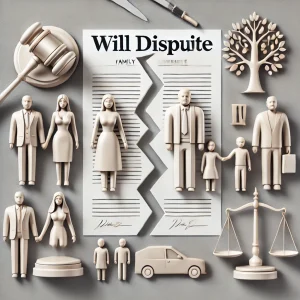Your relative has passed away and now is the time to keep his will as is. Sometimes you may feel deprived or feel that the will was made illegally or under unfair influences and pressures that infringe on your rights. On the other hand, someone may come and argue against the execution of a will with claims that may deprive you and infringe on your rights. It is an uncomfortable, emotionally charged situation, with many things often at stake, financially and emotionally. It is advisable to get advice from a family lawyer.

In cases where the deceased leaves a letter as a will, one should make sure that the letter includes the rules of the will. The letter should be written in the handwriting of the deceased with a signature and an exact date. The letter should contain precise instructions which include the people who will inherit the deceased and their details and what each one inherits. It is not necessary to specify in the letter all the property of the deceased, but he must attach a document that includes his property and write this in the will.
When the deceased signs a document in which he writes the names of the heirs and what each one inherits in his handwriting, signs his signature and indicates a precise and date, and very important: lets the witnesses sign the will to ensure its validity. This is considered most authentic and the easiest to make.
If a printed will is filed, it will not be valid. It has nothing to do with the original signature of the deceased and date. The most important thing in a will that has not been made in front of a lawyer is the manuscript. It should be remembered that anyone can print a will based on their opinion alone and let the deceased sign under the influence of medication or hospital treatment. The deceased must write the will himself to go over it and make sure that it expresses what his heart desires.
There are cases where the deceased dictates his will to someone else. This choice is individual. Although the will is written in handwriting and signed by the deceased and states an exact date. But it is necessary to bring this will to the court to determine whether there is a reason that the deceased allowed someone else to write in his place, there is no absolute ruling on this. A handwritten will is valid when the manuscript of the deceased is on the page.

There are cases where the will is not just one page and there is a source signature only on the last page, it should be remembered that as in all the documents we sign, we are used to signing on the last page that summarizes everything. Whether it is one page or three, it has nothing to do with the location of the signature. The deceased can sign anywhere on the page. As long as the signature is original the court will accept the will.
It is not always necessary to file an objection to the will, it is not common, but in the past if it was proved that the date written on the will was incorrect for some reason and the court accepted it, the will could have been completely revoked. Today the law has been amended and in most cases the date is the least important of all the contents of the will and if the mistake is not important for the continuation of the trial, it can be skipped.
Opposition to a will should be examined in some cases, in case another will is found, here the date definitely plays. The last will of the deceased is the most decisive even if he produced 10 wills. In many wills litigation in the court the deceased’s home eventually reveals another will which sheds light on what is happening and changes the story. Keep in mind that a person’s last will is the last thing he wanted. This is usually expressed in the people who were with him in his last moments. A handwritten will represents the last request of the deceased and the court emphasized this. Make sure that once you have received the will, check that the most is indeed valid and whether it is the only one. Before going to a lawyer you should discuss compromises between family members and remember that sometimes money does not equate to losing a good friend.
In order to exercise your share in the deceased’s property, and to fulfill the will, an application must be submitted for a will execution order. In one of the offices of the Registrar of Inheritance, and after approving the wording of the will, it will be given the status of a judgment. The application can be submitted by the heirs registered in the will (or some of them), and in some cases anyone interested in issuing the order. It is advisable to use the help of a family and divorce lawyer in order to submit the application for a will in an orderly and accurate manner.
